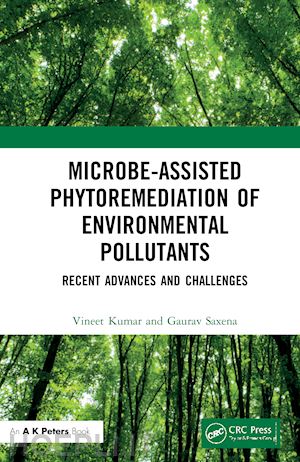Vineet Kumar currently works at School of Environmental Sciences, Jawaharlal Nehru University, Delhi, India. He received his B.Sc. (2008) in Biology and Chemistry from Meerut College, Meerut and M.Sc. (2010) in Microbiology from Ch. Charan Singh University, Meerut, Uttar Pradesh (UP), India. At the same university, he also earned M.Phil. (2011) in Microbiology. Afterward, he joined the Department of Environmental Microbiology in 2012 at Babasaheb Bhimrao Ambedkar (A Central) University (BBAU), Lucknow, UP, India, where he completed his doctoral work (2018) in the field of Environmental Microbiology (specializing in Bioremediation and Metagenomics of Distillery Waste). Due to his outstanding academic contribution during Ph.D., he has received a merit certificate by Vice-Chancellor of BBAU. His research focused on understanding the role and mechanism of rhizospheric bacterial communities to assist metal uptake by wetland plants and assessment of bioaugmentation and biostimulation approaches for bioremediation of hazardous industrial waste. He has published 08 research articles in high impact peer-reviewed journals published from Springer Nature, Elsevier and Frontiers Media. He has also authored/co-authored 04 conferences proceeding articles, 25 book chapters and 05 magazine articles on different aspects of bioremediation and phytoremediation of industrial waste pollutants. He is the editor of three books, Phytoremediation of Environmental Pollutants (CRC Press, USA), Bioremediation for Environmental Sustainability: (Vol-I) Toxicity, Mechanisms of Contaminants Degradation, Detoxification and Challenges (Elsevier, USA), Bioremediation for Environmental Sustainability: (Vol-II) Approaches to Tackle Pollution for Cleaner and Greener Society (Elsevier, The Netherlands), New Trends In Removal Of Heavy Metals From Industrial Wastewater (Elsevier, USA), and author of one (01) book, Recent Advances in Distillery Waste Management for Environmental Safety (CRC Press, USA). He has been presented several papers relevant to his research areas in national and international con¬ferences. He is an active member of various scientific societies including; The Association of Microbiologists of India (AMI), The Biotech Research Society (BRSI), India and Indian Science Congress Association (ISCA), India. He is Secretary General of the Society for Green Environment, Delhi, India. He can be reached at vineet.way18@gmail.com; drvineet.micro@gmail.com Gaurav Saxena has been a Assistant Professor of Microbiology, Department of Microbiology, School of Life and Allied Sciences (SLAS) and a member of Proctorial Board at Baba Farid Institute of Technology (BFIT), Dehradun (UK) India since 2019. He was born in 1989 and completed schooling from Government Schools at Shahjahanpur, Uttar Pradesh (UP) India. Dr. Saxena received his B.Sc. (2010) in Industrial Microbiology, Zoology, Botany and Chemistry from Hemwati Nandan Bahuguna Garhwal (Central) University (HNBGU), Srinagar (Garhwal), Uttarakhand (UK), India. He received his M.Sc. (2013) in Environmental Microbiology from the Babasaheb Bhimrao Ambedkar (Central) University, Lucknow (UP) India, where his interest in environmental issues began with work on environmental remediation using microorganisms. At the same university, Dr. Saxena earned his Ph.D. (2020) in Environmental Microbiology specializing in Microbial Bioremediation and Metagenomics Research. He then went to Jawaharlal Nehru University (JNU), New Delhi, India, where he was trained on a Department of Biotechnology (DBT)-sponsored research project for the production of biofuel from oleaginous bacteria under the supervision of Prof. Indu Shekhar Thakur. He is an active young researcher in the area of Environmental Microbiology, Environmental Toxicology, Bio/Phytoremediation, Metagenomics, and Biological Wastewater Treatment. Dr. Saxena also teaches courses in General Microbiology, Molecular Biology and Microbial Genetics, Immunology, Environmental Microbiology and laboratory techniques in Microbiology and Molecular Biology. Currently, Dr. Saxena is engaged in developing eco-friendly treatment solutions for hazardous industrial effluents. He has been qualified (2016) National Eligibility Test (NET) and received Junior Research Fellowship (JRF) of Department of Science and Technology (DST), Government of India (GOI), India. His research work has been also recognized in social media. Dr. Saxena has been awarded honorary "Young Environmentalist Award-2018" and "Young Achiever Award" by Agro-Environmental Development Society (AEDS) and "Institute of Scholars (InSc)", India respectively, in recognition of his scientific work. He is the editor of five (05) books, Bioremediation for Environmental Sustainability: Toxicity, Mechanisms of Contaminants Degradation, Detoxification and Challenges (Elsevier, USA), Bioremediation for Environmental Sustainability: Approaches to Tackle Pollution for Cleaner and Greener Society (Elsevier, The Netherl












